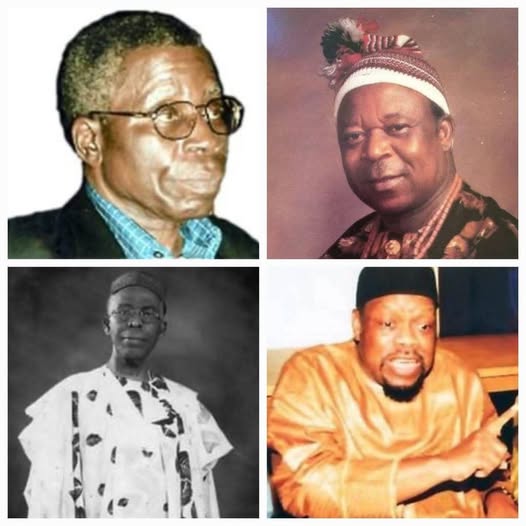Many people today speak of betrayal and mistrust between the Yoruba and Igbo, but few understand the deeper context or the actual conversations that took place among the leaders of both ethnic groups. I had the rare privilege though just a young observer who had learned “how to wash his hands” of sitting in on some of these meetings between Yoruba and Igbo elders.
One such memorable gathering took place in Owerri around 1989. There, I listened in awe as Uncle Bola Ige and other Yoruba leaders addressed claims made by some prominent Igbo figures, including Chief Mbakwe and R.B. Okafor. The accusation? That Chief Obafemi Awolowo had promised to support the Igbo in seceding from Nigeria, and then betrayed them by not following through.
Bola Ige responded with clarity and fire. Turning to Mbakwe, he asked directly:
“You were present at the meeting between Awolowo and Ojukwu, as I was. Did Awo ever make that promise?”
He then turned to two other Yoruba and two Igbo leaders who were also present at that historical meeting.
“I have the transcripts,” he warned. None of the Igbo elders refuted him.
Awolowo, according to Ige, had never promised to follow the East into secession. What he did say was:
“If the Igbo are ever driven out of Nigeria, the Yoruba will take it seriously and reassess their own position.”
The room fell quiet. The accusation crumbled in the face of truth. The Igbo leaders did not deny this version of events.
Then came Bola Ige’s thunderous retort:
“Who are you to accuse the Yoruba of betrayal?”
He laid out a powerful chronology:
1. At Independence, Awolowo offered a joint NCNC-AG government Zik as Prime Minister, Awo as Finance Minister. Negotiations were ongoing when suddenly Zik announced a coalition with the NPC instead. The East aligned with the North to crush the West, jailing Awo and his allies.
2. In 1965, the West and East agreed to boycott the election. They reached consensus in the early hours, but by morning, the Igbo broke ranks and voted while the Yoruba held the line.
3. In 1979, post-election negotiations for a Yoruba-Igbo coalition (UPN-NPP) were underway when the NPP suddenly entered a coalition with the North’s NPN without notice.
4. In 1983, the same betrayal occurred. Yet Awolowo still sought unity. He met Zik again in Benin, pleading that only a Yoruba-Igbo alliance could rescue Nigeria. The meeting ended inconclusively, and again the East returned to align with the North.
With visible emotion, Uncle Bola continued:
“We can go on and on. But let me ask you: how many Igbo have been killed in Yoruba towns like Lagos, Ibadan, Akure, or Oshogbo? You thrive in our cities, build your businesses here, and attend our schools yet you call us enemies. Meanwhile, your people are regularly killed in Kaduna, Kano, Bauchi, Zaria, and your shops looted. Yet you count the North as allies. If you choose to be perpetual slaves, we cannot help you.”
The silence that followed was deafening. No one interrupted him. No one challenged the facts. The Yoruba delegation stood and ended the meeting. I can only hope Chief C.O. Adebayo’s memoirs will someday detail that historic exchange further.
Key Takeaways:
A. The Yoruba have long extended a hand across the Niger. The Igbo, for decades, declined to take it until recently.
B. Many Igbo leaders of the 1970s to 1990s actively propagated the myth that Awolowo betrayed them, using it to solidify internal unity and distract from internal failures. The one common rallying point was hatred for the Yoruba.
C. Time is a great healer. Many Igbo reading this today may be learning, for the first time, that their leaders knew Awolowo never betrayed Ojukwu or the East during the Civil War.
A Call to Our Generation:
Even if our parents quarreled, should we, their children, inherit their grudges? Must we perpetuate old divisions in a Nigeria struggling for unity and growth?
It is time.
Time for a genuine handshake across the Niger.
Time to heal, to build, and to move forward together.
Originally shared on the “Friends Ikoyi Club 1938” Forum by Dr. Adenike Marinho
(Medical Doctor and Social Commentator)
FOLLOW US ON:
FACEBOOK
TWITTER
PINTEREST
TIKTOK
YOUTUBE
LINKEDIN
TUMBLR
INSTAGRAM































